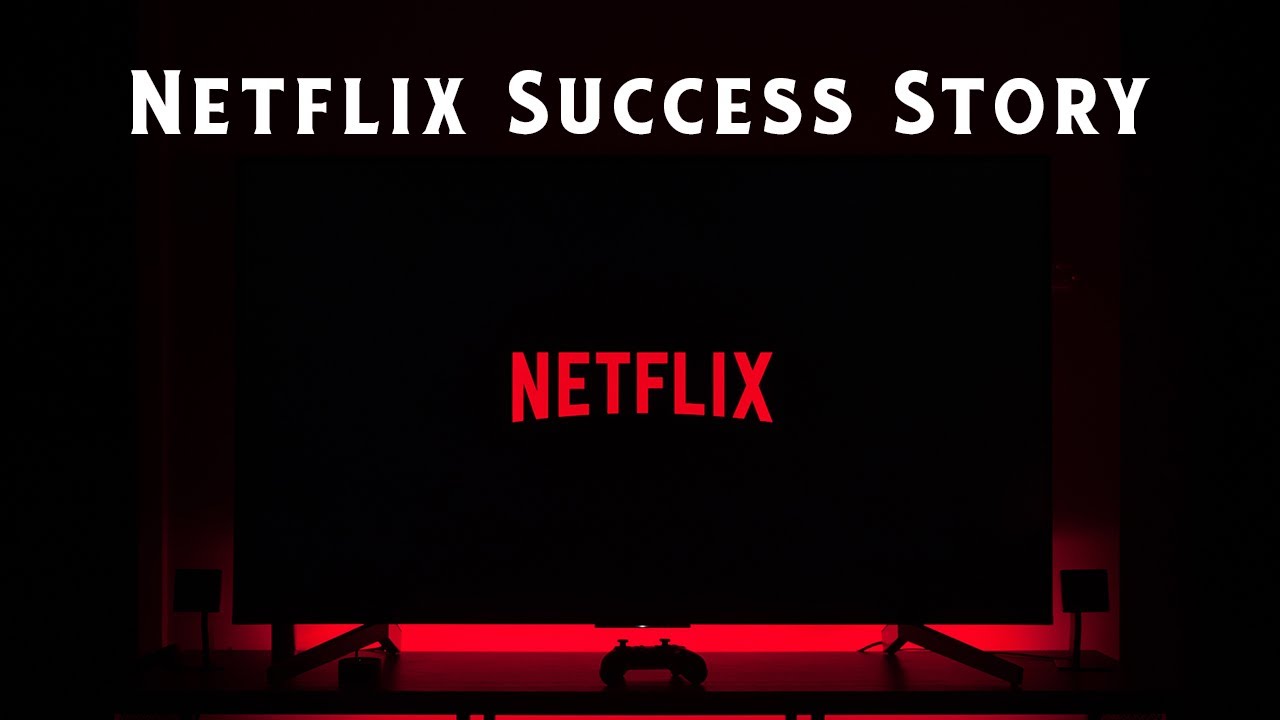Marc Randolph and Reed Hastings established Netflix on August 29, 1996, in Scotts Valley, California. Hastings, who was both a computer scientist and mathematician, had previously co-founded Pure Software. This venture was acquired by Rational Software in the same year for $750 million, marking a significant acquisition in Silicon Valley’s history at that time. Meanwhile, Randolph had served as a marketing director at Pure Software, having joined after Pure Atria acquired a company he worked for. He had prior experience as a co-founder of MicroWarehouse, a computer mail-order company, as well as a vice president of marketing at Borland.
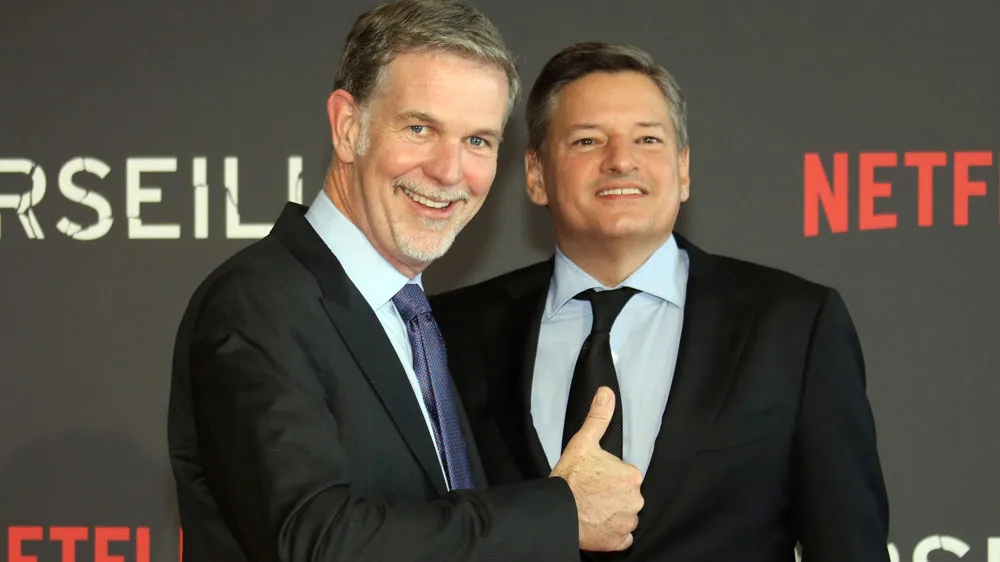
The concept of Netflix emerged during the times when Hastings and Randolph commuted together between their residences in Santa Cruz and Pure Atria’s headquarters in Sunnyvale. Notably, Patty McCord, who would later become the head of Human Resources at Netflix, was also part of this carpool arrangement. Randolph’s admiration for Amazon’s business model motivated him to seek a similar approach for selling a wide range of portable items online. Initially, they considered the idea of selling or renting VHS tapes, but the costs of stocking and the fragility of shipping these items led them to dismiss this notion.
Their attention shifted to DVDs when they learned about their introduction in the United States in early 1997. To test the viability of selling or renting DVDs by mail, they sent a compact disc to Hastings’s residence in Santa Cruz. The successful arrival of the disc prompted them to venture into the Home-video sales and rental industry, which was valued at $16 billion. Hastings often recounted his decision to start Netflix as a response to being fined $40 for a late return at a Blockbuster store, though this claim has been disputed by Randolph. With a $2.5 million investment from the sale of Pure Atria, Hastings kickstarted Netflix.
Netflix was launched as the pioneer DVD rental and sales website, initially offering 925 titles with the involvement of 30 employees. Randolph and Hastings engaged in discussions with Jeff Bezos, during which Amazon expressed interest in acquiring Netflix for a sum ranging between $14 million and $16 million. While Randolph initially deemed the offer reasonable due to concerns about Amazon’s competition, Hastings, as the majority owner with a 70% stake, declined the proposition during their plane journey back.
At first, Netflix operated by charging for each DVD rental, but in September 1999, they introduced a new approach: a monthly subscription. This change led to the abandonment of the per-rental model by early 2000. Instead, the company focused on a flat-fee subscription that allowed customers to rent DVDs without worrying about due dates, late fees, shipping costs, or rental charges per title.
During the dot-com bubble in September 2000, Netflix faced financial losses. At that time, the co-founders Hastings and Randolph proposed selling the company to Blockbuster for $50 million. However, Blockbuster’s CEO, John Antioco, dismissed the offer, believing it to be a joke, and claimed that the dot-com hype was exaggerated. In spite of rapid growth in early 2001, the aftermath of the dot-com bubble burst and the September 11 attacks led Netflix to postpone its planned initial public offering (IPO) and lay off one-third of its workforce, which then consisted of 120 employees.
The rise in popularity of DVD players as holiday gifts in late 2001 drove the demand for DVD subscription services. Netflix benefited from this trend, with its chief talent officer, Patty McCord, noting significant growth. On May 29, 2002, Netflix became a publicly-traded company, selling 5.5 million shares of common stock at $15.00 per share. In 2003, the U.S. Patent & Trademark Office granted Netflix a patent covering its subscription rental service and various extensions. This marked a turning point as Netflix posted its first profit in the same year, earning $6.5 million on revenues of $272 million. By 2004, profit had surged to $49 million on revenues exceeding $500 million. During 2005, Netflix boasted a library of 35,000 films and shipped out 1 million DVDs daily.
In 2004, Blockbuster entered the DVD rental service arena, offering online rentals with the option to return DVDs at physical stores. By 2006, Blockbuster’s service had amassed two million users, competing with Netflix but also drawing customers away. Netflix responded by reducing its fees in 2007. Though there’s a common belief that Netflix was the sole factor in Blockbuster’s decline, Blockbuster’s financial struggles and internal conflicts also contributed to its downfall.
Netflix took legal action on April 4, 2006, suing Blockbuster for patent infringement in a lawsuit centered around online DVD rental. They accused Blockbuster of violating two Netflix patents, including its method of arranging DVDs in a dynamic queue for customers and its process of using ranked preferences to send DVDs to subscribers. The companies settled the dispute on June 25, 2007, with the terms remaining undisclosed.
On October 1, 2006, Netflix introduced the Netflix Prize, a $1,000,000 reward for anyone who could develop a video-recommendation algorithm better than their existing one, Cinematch, by more than 10%. The prize was ultimately awarded on September 21, 2009, to the “BellKor’s Pragmatic Chaos” team. Cinematch, launched in 2000, was a recommendation system that introduced users to movies they might not have otherwise encountered.
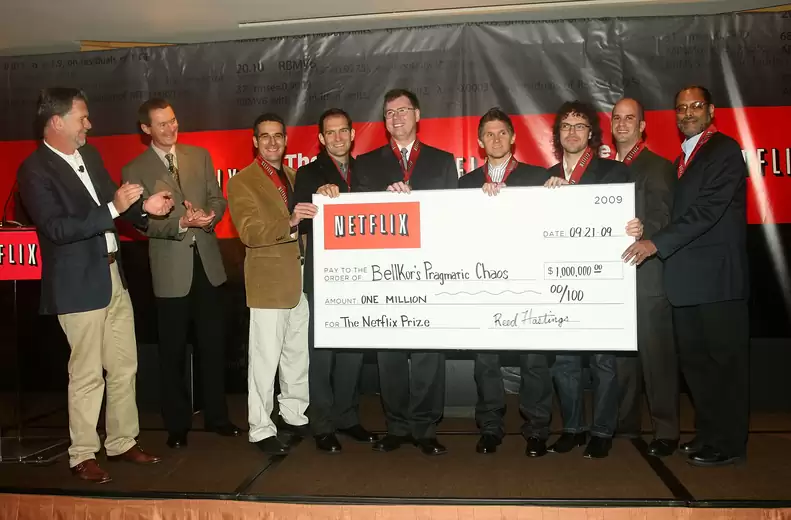
Netflix’s division Red Envelope Entertainment played a role in licensing and distributing independent films, such as “Born into Brothels” and “Sherrybaby.” Additionally, in late 2006, they ventured into original content production with filmmakers like John Waters. However, Red Envelope Entertainment was closed down in 2008.
Transitioning to Streaming Services (2007–2012):
In January 2007, Netflix introduced a streaming media service, offering video on demand through the internet. However, the initial library for streaming was smaller, with only 1,000 films compared to the 70,000 available on DVD at that time. The idea of streaming movies had been considered for some time, but it wasn’t until the mid-2000s that internet speeds and bandwidth costs had improved enough to support downloading movies. Originally, a “Netflix box” was proposed, designed to download movies overnight for viewing the next day. By 2005, Netflix had secured movie rights and developed the box and service. However, with the popularity of streaming services like YouTube, even without high-definition content, the hardware device concept was discarded in favor of streaming.
In February 2007, Netflix marked a significant milestone by delivering its billionth DVD, which happened to be a copy of the movie “Babel,” to a customer in Texas. In April of the same year, Netflix enlisted Anthony Wood, the founder of ReplayTV, to create a “Netflix Player.” This device aimed to enable streaming content to be directly played on TVs instead of computers. Eventually, Netflix decided to discontinue this project to encourage other hardware manufacturers to integrate Netflix support into their devices. This idea led to the creation of the digital media player known as Roku.
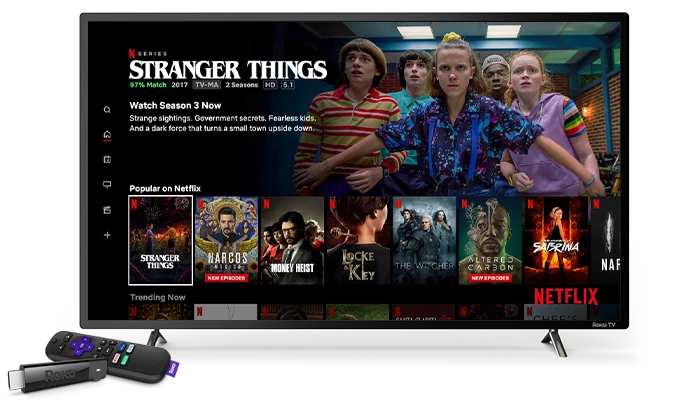
By January 2008, all customers with rental-disc subscriptions gained access to unlimited streaming at no extra charge. This change was prompted by the emergence of services like Hulu and Apple’s video rentals. In August 2008, Netflix faced a challenge when their database got corrupted, causing a three-day delay in shipping DVDs due to this technical issue. To address such problems, the company transitioned its data storage to Amazon Web Services cloud. In November 2008, Netflix started offering Blu-ray rentals and ceased the sale of used DVDs. The shift from physical media to streaming continued, with Netflix’s streaming overtaking DVD shipments in 2009.
In January 2010, Netflix reached agreements with Warner Bros., Universal Pictures, and 20th Century Fox to delay new release rentals by 28 days before making them available for rental. This move aimed to support physical copy sales for studios. The same year, Netflix secured a deal with Relativity Media for streaming movies. In 2010, they also acquired the rights to “Breaking Bad” after AMC, the original broadcaster, had considered canceling the show. This move expanded the show’s audience when new viewers binge-watched past episodes on Netflix before the fourth season’s release, boosting viewership significantly.
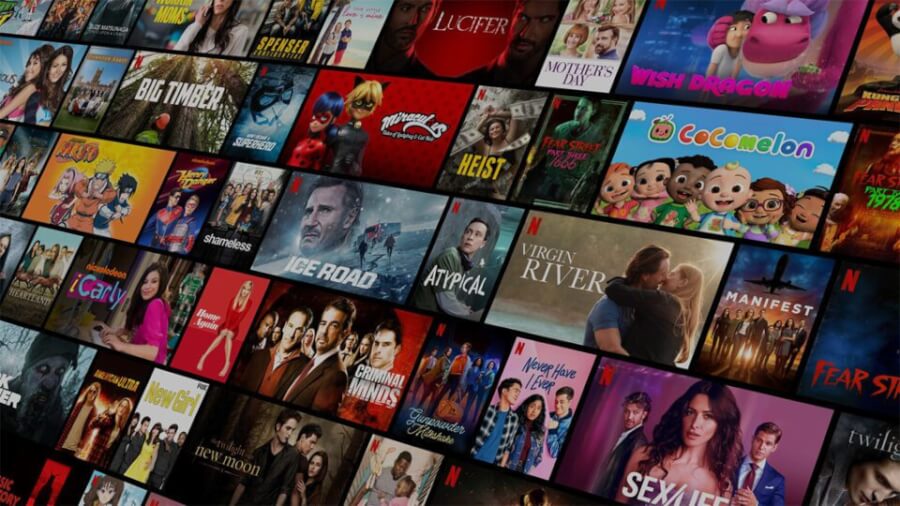
In January 2011, Netflix partnered with various manufacturers to include branded Netflix buttons on remote controls for compatible devices like Blu-ray players. By May 2011, Netflix had become the biggest source of internet streaming traffic in North America, accounting for 30% of peak-hour traffic.
In July 2011, Netflix announced the separation of its subscription plans into two: one for streaming and the other for DVD rentals. Streaming cost $7.99 per month, with DVD rental starting at the same price. In September 2011, Netflix made a content deal with DreamWorks Animation and expanded its services to Latin American countries. However, plans to rebrand its DVD rental service as “Qwikster” were later revised, and the service continued as Netflix.
Starting in 2012, Netflix expanded to Europe, launched multi-year agreements with companies like The Weinstein Company, and acquired the domain name DVD.com. By this time, Netflix was not only streaming content but also producing original shows, contributing to its growth as a prominent streaming platform.
Development of Original Programming (2013–2017):
Starting in 2011, Netflix embarked on creating its own original content. In March of that year, the company ordered its first original series, “House of Cards,” a political drama starring Kevin Spacey. This move outbid traditional U.S. cable networks and marked the first instance of a streaming service commissioning a first-run television series. In the same year, Netflix added two more significant shows: the comedy-drama “Orange is the New Black” and a new season of the previously cancelled Fox sitcom “Arrested Development.” Instead of the usual weekly episode releases, Netflix chose to release the entire first season of “Lilyhammer” on February 8, 2012.
On February 1, 2013, Netflix released “House of Cards” as its first “Netflix Original” production. Later that month, they partnered with DreamWorks Animation to create children’s television series based on DreamWorks properties. “Orange is the New Black” premiered in July 2013 and quickly gained popularity. In March 2013, a Facebook sharing feature was introduced, allowing U.S. subscribers to see what their friends were watching. This feature became possible after the modification of the Video Privacy Protection Act. Additionally, in August 2013, the “Profiles” feature, allowing multiple user accounts, was reintroduced.
Marvel Television and ABC Studios collaborated with Netflix in November 2013 to develop four television series based on Marvel Comics characters, with “Daredevil” and “Jessica Jones” premiering in 2015. The Luke Cage and Iron Fist series followed in 2016 and 2017, respectively. Netflix’s expansion continued, with launches in various European countries and Asia, and eventually becoming available worldwide by 2016. Offline playback was introduced in 2016, allowing content to be downloaded for offline viewing.
Throughout 2016, Netflix released a significant number of original series and films, surpassing other networks. In 2017, the company acquired comic book publisher Millarworld, signed a development deal with Shonda Rhimes, and announced a major investment in original content. Their focus shifted towards having half of their library consist of original content, with plans to invest heavily in films and anime. A “Skip Intro” feature was also introduced, allowing viewers to skip show intros.
In this period, Netflix made various agreements with creators and studios, expanded its services to more countries, and showed a strong commitment to producing its own content. The company’s efforts in developing original programming contributed significantly to its growth and prominence in the streaming industry.
Expansion into International Productions (2017–2020):
From 2017 to 2020, Netflix continued to expand its global presence and investment in original content. In November 2017, Netflix revealed its plans for an original Colombian series, marking its first foray into Colombian production. Around the same time, the company signed deals with key creators, including Stranger Things director-producer Shawn Levy and several renowned comedians for exclusive stand-up comedy specials.
In 2018, Netflix ventured into securing exclusive rights for movies like The Cloverfield Paradox, gaining the ability to offer them to viewers shortly after their initial trailers aired. The company also made a strategic move by integrating its subscription video-on-demand service into Sky UK’s pay-TV offering. This partnership enabled Sky UK customers to access Netflix content alongside their regular channels.
Netflix expanded its reach by partnering with established figures like Barack and Michelle Obama to produce documentaries and features under their newly formed production company. The company also took steps to offer interactive streaming by collaborating with Telltale Games to bring video games to its platform.
Furthermore, Netflix focused on diversifying its original content by entering agreements with Dark Horse Entertainment for adaptations of comics and forming partnerships with renowned creators like David Benioff and D.B. Weiss, creators of Game of Thrones. These collaborations aimed to produce captivating series and films for the global audience.
In 2019, Netflix achieved a significant milestone by becoming a member of the Motion Picture Association of America (MPAA), the first streaming service to join. The company also expanded its collaboration with Nickelodeon to create original animated content based on beloved characters.
As part of its international expansion efforts, Netflix made strides in producing content in various countries, embracing diverse perspectives. The company’s commitment to producing content worldwide reinforced its position as a leading global streaming platform.
Venturing into Gaming, Success of Squid Game, and the End of DVDs (2021–present):
During this period, Netflix has embarked on a series of significant developments. In March 2021, it emerged as a leader in the film industry by earning the most Academy Award nominations, clinching seven wins, and then going on to secure a record number of Emmy Awards. The company furthered its influence by acquiring the U.S. pay television rights to Sony Pictures Entertainment releases, expanding its content offerings.
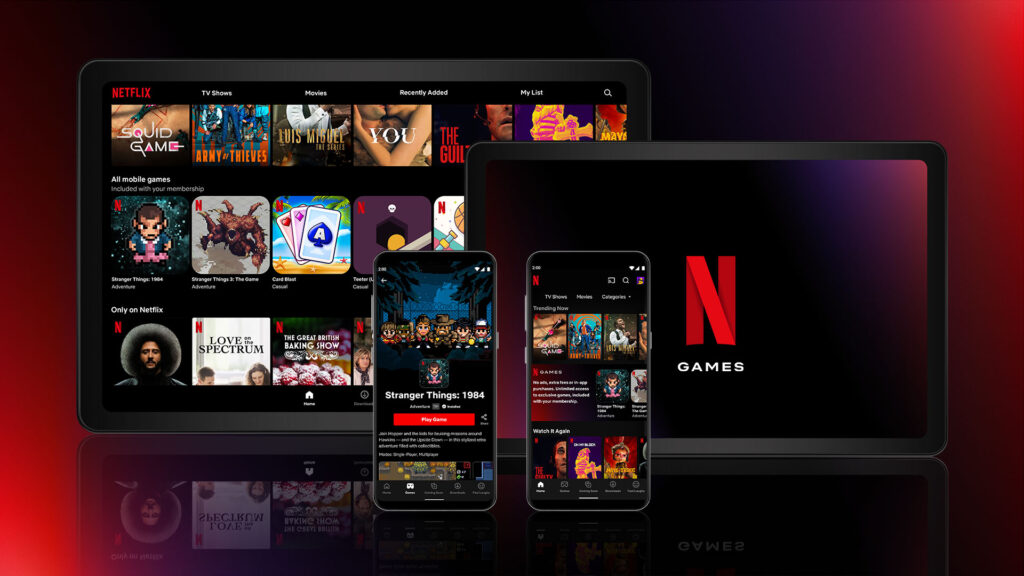
The expansion continued as Netflix established its presence in Canada, Sweden, Rome, and Istanbul to bolster its original content creation in these regions. The company hosted “Geeked Week,” a virtual event spotlighting upcoming genre titles. It signed notable deals, such as a partnership with Jennifer Lopez’s production company, the launch of an online store with Netflix-branded products, and a deal with Steven Spielberg’s Amblin Partners to create new feature films.
A major turning point was Netflix’s entrance into the gaming industry. Hiring Mike Verdu, a former executive from Electronic Arts and Facebook, as Vice President of Game Development marked the company’s foray into the gaming space. Plans to release mobile games as part of subscribers’ plans were unveiled, with the launch of interactive games like Stranger Things 3: The Game. The company also initiated the Netflix Book Club, partnering with Starbucks to engage readers in book adaptation discussions.
The release of the South Korean series Squid Game became a monumental success, garnering record-breaking viewership numbers globally. Netflix solidified its position by acquiring companies like Scanline VFX and expanding its creative partnerships with prominent figures such as Roberto Patino and Spike Lee.
As part of its ongoing evolution, Netflix altered its viewership metrics to better represent engagement, indicating a shift towards longer viewing periods. It also unveiled initiatives like the Netflix Is a Joke comedy festival, acquired Animal Logic, and announced plans for a production complex in New Jersey and a gaming studio in Southern California.
By adapting to changing viewing habits and innovating across various sectors, such as entertainment and gaming, Netflix has solidified its role as a pioneering global streaming platform.
Also Read: Bank of America Success Story: History & Success Factors
To read more content like this, subscribe to our newsletter
